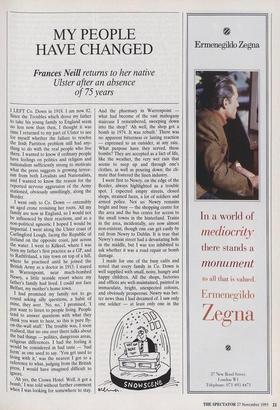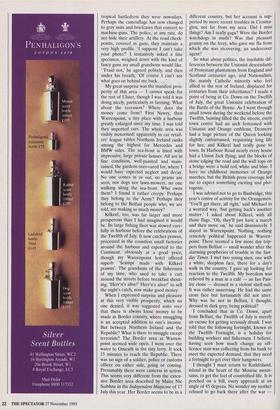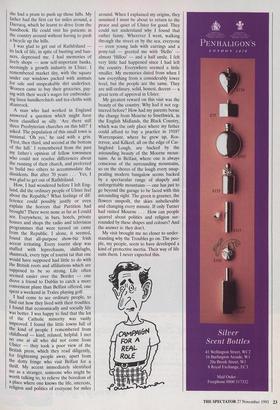MY PEOPLE HAVE CHANGED
Frances Neill returns to her native Ulster after an absence of 75 years
I LEFT Co. Down in 1918. I am now 82. Since the Troubles which drove my father to take his young family to England seem no less now than then, I thought it was time I returned to my part of Ulster to see for myself whether the failure to resolve the Irish Partition problem still had any- thing to do with the real people who live there. I wanted to know if ordinary people have feelings on politics and religion and nationalism sufficiently strong to motivate What the press suggests is growing terror- ism from both Loyalists and Nationalists, and I wanted to know the reason for the reported nervous aggression of the Army stationed, obviously unwillingly, along the Border.
I went only to Co. Down — ostensibly an aged crone revisiting her roots. All my family are now in England, so I would not be influenced by their reactions, and as a non-political agnostic I hoped I would be Impartial. I went along the Ulster coast of Carlingford Lough, facing the Republic of Ireland on the opposite coast, just across the water. I went to Kilkeel, where I was born my father's first practice as a GP, and to Rathfriland, a tiny town on top of a hill, where he practised until he joined the British Army as a doctor in 1915. I stayed in Warrenpoint, near much-bombed Newry, a little seaside resort where my father's family had lived. I could not face Belfast, my mother's home town.
I had promised my family not to go round asking silly questions, a habit of mine, they aver. 'No, no,' I promised, 'I just want to listen to people living. People tend to answer questions with what they think you want to hear, so this is pure fly- on-the-wall stuff.' The trouble was, I soon realised, that no one over there talks about the bad things — politics, dangerous areas, religious differences. I had the feeling it would be considered in bad taste — 'bad form' as one used to say. 'You get used to living with it,' was the nearest I got to a reference to what, judging from the British press, I would have imagined difficult to ignore.
Ah yes, the Crown Hotel. Well, it got a bomb,' I was told without further comment when I was looking for somewhere to stay. And the pharmacy in Warrenpoint what had become of the vast mahogany staircase I remembered, sweeping down into the shop? 'Afi well, the shop got a bomb in 1974. It was rebuilt.' There was no apparent bitterness or lasting reaction — expressed to an outsider, at any rate. What purpose have they served, these bombs? They are accepted as a fact of life, like the weather, the very wet rain that seems to seep up and through one's clothes, as well as pouring down; the cli- mate that fostered the linen industry.
I went first to Newry, on the edge of the Border, always highlighted as a trouble spot. I expected empty streets, closed shops, strained faces, a lot of soldiers and armed police. Not so. Newry remains bright and busy — the shopping centre for the area and the bus centre for access to the small towns in the hinterland. Trains in the area, incidentally, are now almost non-existent, though one can get easily by rail from Newry to Dublin. It is true that Newry's main street had a devastating hole in the middle, but I was too inhibited to ask whether it was a road repair or bomb damage.
I made for one of the busy cafés and noted that every family in Co. Down is well supplied with small, noisy, hungry and happy children. All the shops, factories and offices are well-maintained, painted in immaculate, bright, unexpected colours, and obviously prosperous. Newry was bet- ter news than I had dreamed of. I saw only one soldier — at least only one in the
tropical battledress they wear nowadays. Perhaps the camouflage has now changed to grey suits and briefcases that convert to machine-guns. The police, at any rate, do not hide their artillery. At the road check- points, covered in guns, they maintain a very high profile. suppose I can't take your photo?' I tentatively asked a fine specimen, weighed down with the kind of fancy guns my small grandsons would like. "Fraid not,' he agreed politely, and then under his breath, 'Of course I can't see what goes on behind me back . . . '
My great surprise was the manifest pros- perity of this area — I cannot speak for the rest of Ulster, though I was told it was doing nicely, particularly in farming. What about the recession? Where does the money come from? First Newry, then Warrenpoint, a tiny place with a harbour greatly enlarged since my time. I was told they imported cars. The whole area was visibly motorised; apparently in car retail- ers' league tables Northern Ireland ranks among the highest for Mercedes and BMW sales. The sea-front is lined with impressive, large private houses. All are in fine condition, well-painted and main- tained, the gardens over-cared for, where I would have expected neglect and decay. No one comes in or out, no prams are seen, nor dogs nor lawn-mowers, no one walking along the sea-front. Who owns them? I found it rather creepy. Perhaps they belong to the Army? Perhaps they belong to the Belfast people who, we are told, are making so much money?
Kilkeel, too, was far larger and more prosperous than I had imagined it would be. Its large fishing fleet was stowed care- fully in harbour before the celebrations of the Twelfth of July. It now catches prawns, processed in the countless small factories around the harbour and exported to the Continent, obviously at a good price, though my Warrenpoint hotel offered superb 'Scampi made with Kilkeel prawns'. The grandsons of the fishermen of my time, who used to take a cart around the streets before breakfast shout- ing, `Herr'n's alive!' Herr'n's alive!' to sell the night's catch, now make good money.
When I expressed surprise and pleasure at this very visible prosperity, which no one denied, it was suggested sotto voce that there is always loose money to be made in Border country, where smuggling is an accepted addition to one's income. But between Northern Ireland and the Republic? What is there to smuggle except terrorists? The Border area at Warren- point seemed wide open. I went over the water to Omeath in the tiny ferry. It took 15 minutes to reach the Republic. There was no sign of a soldier, police or customs officer on either side, going or coming. Presumably there were cameras in action. This seems very different from the exten- sive Border area described by Maire Nic Suibhne in the Independent Magazine of 17 July this year. Her Border seems to be in a different country, but her account is sup- ported by more recent troubles in Crosma- glen, not far from my area. Did I miss things? Am I really gaga? Were the Border watchdogs in mufti? Was that pleasant granny on the ferry, who gave me flu from which she was recovering, an undercover agent?
So what about politics, the insoluble dif- ferences between the Unionist descendants of Protestant plantations from England and Scotland centuries ago, and Nationalists, the mainly Catholic minority who feel allied to the rest of Ireland, displaced for centuries from their inheritance? I made a point of being in Co. Down on the Twelfth of July, the great Unionist celebration of the Battle of the Boyne. As I went through small towns during the weekend before the Twelfth, bunting filled the the streets, every town centre had an arch festooned with Unionist and Orange emblems, Dromore had a huge picture of the Queen looking slightly embarrassed, requesting long life for her, and Kilkeel had really gone to town. In Harbour Road nearly every house had a Union Jack flying, and the blocks of stone edging the road and the wall tops on a bridge were a bold red, white and blue. I have no childhood memories of Orange marches, but the British press coverage led me to expect something exciting and pho- togenic.
I was advised not to go to Banbridge, this year's centre of activity for the Orangemen. `You'll get there, all right,' said Michael in a worried way, 'but getting back's another matter.' I asked about Kilkeel, with all those flags. 'Oh, they'll just have a march and then move on,' he said dismissiveIy. I stayed in Warrenpoint. Nothing, nothing remotely political happened in Warren- point. There seemed a few more day trip- pers from Belfast — small wonder after the alarming prophecies of trouble in the Sun- day Times. I met two young men, one with a white, sleepless face, there for a day's walk in the country. I gave up looking for reaction to the Twelfth. My boredom was relieved by a man in a café — an Ian Pais- ley clone — dressed in a violent shell-suit. It was rather unnerving. He had the same cross face but fortunately did not utter. Why was he not in Belfast, I thought, dressed in dark grey, being political?
I concluded that in Co. Down, apart from Belfast, the Twelfth of July is merely an excuse for getting seriously drunk. I was told that the following fortnight, known as the Twelfth Fortnight, is a holiday for building workers and fishermen. I believe, having seen how much change an off- licence man was collecting from his bank to meet the expected demand, that they need a fortnight to get over their hangovers.
I thought I must return to Rathfriland, inland in the heart of the Mourne moun- tains, to get the feel of countrified life. It is perched on a hill, every approach at an angle of 45 degrees. No wonder my mother refused to go back there after the war —
she had a pram to push up those hills. My father had the first car for miles around, a Darracq, which he learnt to drive from the handbook. He could visit his patients in the country around without having to push a bicycle up the hills.
I was glad to get out of Rathfriland its lack of life, in spite of bunting and ban- ners, depressed me. I had memories of lively shops — now self-important banks, seemingly a growth industry in Ulster. I remembered market day, with the square under our windows packed with animals for sale and unspeakable dirt underfoot. Women came to buy their groceries, pay- ing with their week's wages for embroider- ing linen handkerchiefs and tea-cloths with shamrock.
A man who had worked in England answered a question which might have been classified as silly. 'Are there still three Presbyterian churches on this hill?' I asked. The population of this small town is minimal. 'Oh yes,' he said with a grin. `First, then third, and second at the bottom of the I remembered from the past my father's opinion of fellow townsmen who could not resolve differences about the running of their church, and preferred to build two others to accommodate the dissidents. But after 70 years . . . Yes, I was glad to get out of Rathfriland.
How, I had wondered before I left Eng- land, did the ordinary people of Ulster feel about the Republic? What feelings of dif- ference could possibly justify or even explain the horrors that Partition had brought? There were none as far as I could see. Everywhere, in bars, hotels, private houses and shops the radio and television Programmes that were turned on came from the Republic. I alone, it seemed, found that all-purpose show-biz Irish accent irritating. Every tourist shop was stuffed with leprechauns, shillelaghs, shamrock, every type of tourist tat that one would have supposed had little to do with the British roots and affiliations which are supposed to be so strong. Life often seemed easier over the Border — one drove a friend to Dublin to catch a more convenient plane than Belfast offered, one spent a weekend in Tralee playing golf. I had come to see ordinary people, to find out how they lived with their troubles. I found that economically and socially life was better. I was happy to find that the lot of the Catholic minority was vastly improved. I found the little towns full of the kind of people I remembered from childhood — kind, relaxed, helpful. I met no one at all who did not come from Ulster — they took a poor view of the British press, which they read diligently, for frightening people away, apart from the dotty fringe who visit Belfast for a thrill. My accent immediately identified me as a stranger, someone who might be worth talking to, to relieve the boredom of a place where one knows the life, interests, religion and politics of everyone for miles around. When I explained my origins, they assumed I must be about to return to the peace and quiet of Ulster for good. They could not understand why I found that rather funny. Wherever I went, walking through the street or by the sea, everyone — even young lads with earrings and a pony-tail — greeted me with 'Hello' almost 'Hilloo' — and a half smile. I felt very little had happened since I had left the country. Everywhere seemed a little smaller. My memories dated from when I saw everything from a considerably lower level, but the people are the same. They are still ordinary, solid, honest, decent — a great term of approval in Ulster.
My greatest reward on this visit was the beauty of the country. Why had it not reg- istered before? How had my parents borne the change from Mourne to Smethwick, in the English Midlands, the Black Country, which was the only place where my father could afford to buy a practice in 1918? Warrenpoint, where he grew up, Ros- trevor, and Kilkeel, all on the edge of Car- lingford Lough, are backed by the astounding beauty of the Mourne moun- tains. As in Belfast, where one is always conscious of the surrounding mountains, so on the shores of the lough every unap- pealing modern bungalow seems backed by a spectacular range of shapely and unforgettable mountains — one has just to go beyond the garage to be faced with this astounding sight. The green is greener, the flowers unspoilt, the skies unbelievable and changing every minute. If only Turner had visited Mourne . . . How can people quarrel about politics and religion sur- rounded by these shapes and colours? And the answer is: they don't.
My visit brought me no closer to under- standing why the Troubles go on. The peo- ple, my people, seem to have developed a kind of protective inertia. Their way of life suits them. I never expected this.












































































 Previous page
Previous page